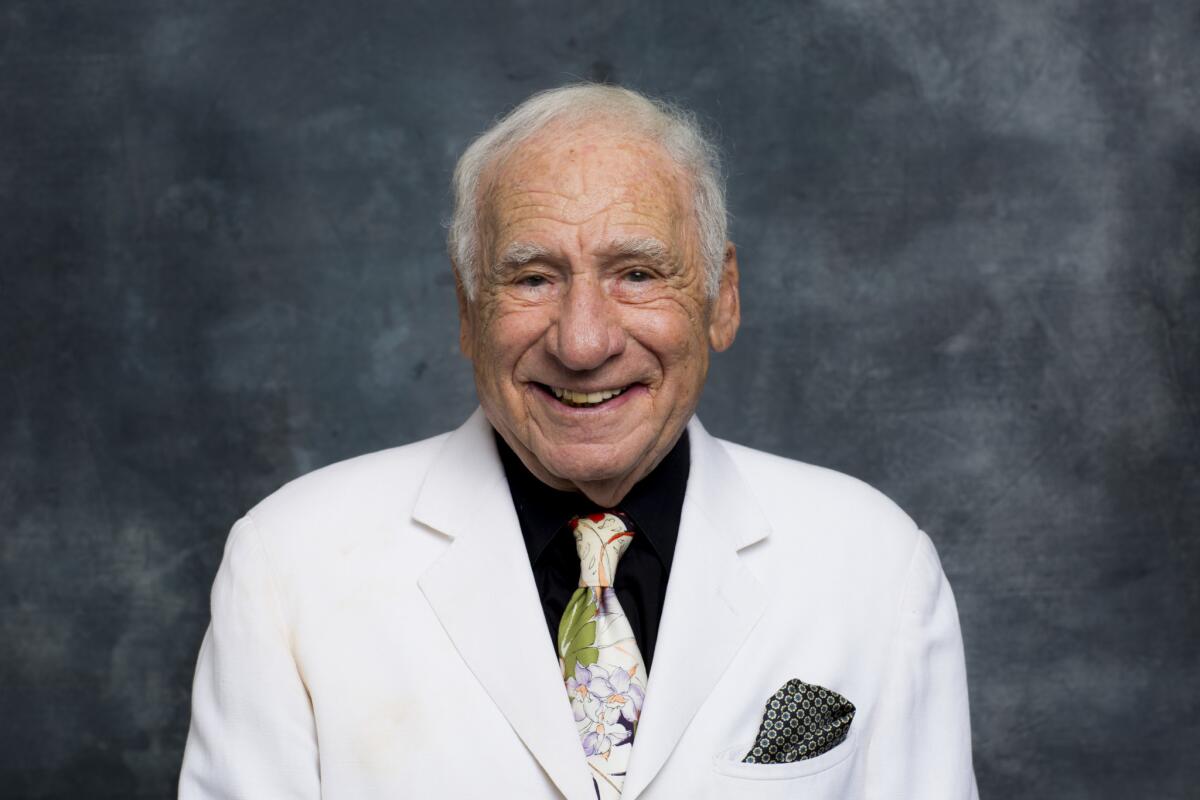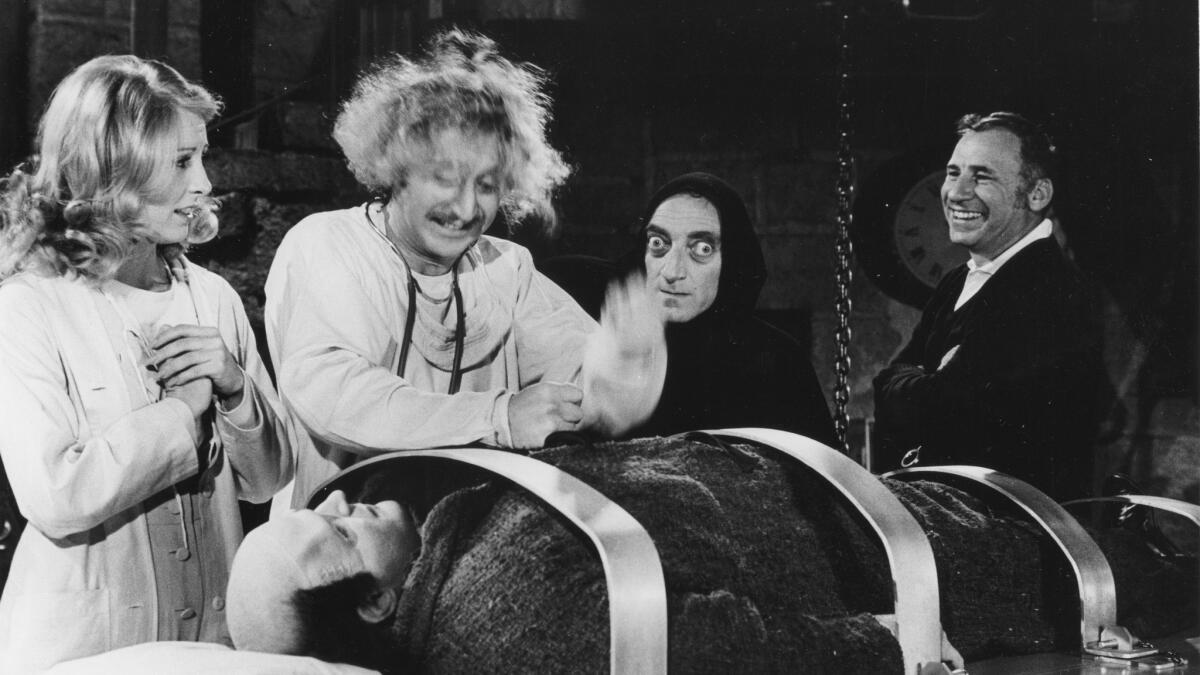Loud and lively at 90, Mel Brooks talks about Gene Wilder, political correctness and his classic movies

Comedy legend Mel Brooks has a new book about the making of his 1974 classic “Young Frankenstein.”
“If you’re quiet, you’re not living,” Mel Brooks once said. “You’ve got to be colorful and loud and lively.”
As a writer, director and performer, Brooks — the man behind such classic comedies as “The Producers,” “Blazing Saddles,” and “Young Frankenstein” — has been all of that and then some, and, at age 90, his riffing skills are as sharp as ever. “I like ad libbing,” he said on a recent afternoon. “Just give me the premise and get out of the way.”
With a career that stretches back to the earliest days of television, Brooks is also bursting with great anecdotes, and he shares some of them in a new book about the making of 1974’s “Young Frankenstein.” Packed with behind-the-scenes photos and new and archival interviews with the film’s key players, “Young Frankenstein: A Mel Brooks Book: The Story of the Making of the Film,” written with Times film reporter Rebecca Keegan, hits stores Oct. 18. That same day, the movie will be back in select theaters for a special one-night encore.
Earlier this month — the day after hosting a screening of “Young Frankenstein” on the 20th Century Fox studio lot, where the film was made — Brooks spoke with The Times about his collaboration with the late Gene Wilder, who starred in and co-wrote “Young Frankenstein,” how political correctness has changed comedy and why he’s not ready to quiet down any time soon.

In the foreword to the new book, Judd Apatow says “Young Frankenstein” is a perfect comedy. Directors often see flaws in their own films that the audience doesn’t. How does the movie look to you today?
You know, strangely enough, contrary to what you said, when I saw it yesterday on a big screen, I thought it was better than the first rough screening of it 40-something years ago when I was a nerdy kid.
Watching it on the big screen gives you an even greater appreciation for Gene Wilder’s performance.
His performance is absolutely Promethean. It’s his very best work in film.
Gene was essentially really reticent and shy and when he broke out, he broke out like a volcano. He never just eased out of being mousy and quiet — he busted out like it was Dr. Jekyll and Mr. Hyde, and suddenly this new person would be yelling and commanding our attention. He did that beautifully in “Young Frankenstein.”
You made three movies with him — “The Producers,” “Blazing Saddles” and “Young Frankenstein” — but at a certain point later in his career, he essentially stopped making comedies because he felt they were becoming too crass and vulgar. Was that something you two ever discussed?
He told me when we were working on “The Producers,” “I love this picture — there’s not a dirty word in it. We’re getting laughs on story and characters. We’re not getting laughs on sexual innuendo and dirty stuff.” I said, “I never even thought of it that way.”
Gene was kind of naïve, kind of an innocent, and when movies rested on profanity, he was upset…. But you know, everybody blames all the questionable, dirty stuff on me, but Gene Wilder came up with “What knockers!” [in “Young Frankenstein.”] You can blame that on him. Sweet, innocent Gene!
The book has lots of great stuff from the Fox archives, but is there anything that’s lost forever that you wish you’d held onto?
I wish I had kept all the scribbles on legal pads that led to the scripts.
It would be a goldmine for screenplay-writing students to see what incredible changes characters and stories go through before they become the screenplay. It’s quite a toboggan ride down a steep hill trying to write a script.
Looking back, it’s pretty mind-boggling that you put out both “Blazing Saddles” and “Young Frankenstein” in the same year.
I guess I was the king of movies for that year, for ’74. Nobody had two pictures back-to-back that were so big and gathered so much attention. It was great.
“Blazing Saddles” really pushed the boundaries of racial and ethnic comedy in movies at the time. Do you think it could be made today?
You know, I think it could if the good guys were innocent and good and the bad guys could use profanity and the N-word. But you’ve got to understand the good and evil of it, and only the evil people are allowed to use the bad words and the good people are on the side of heaven — they’re allowed to defend themselves.
There is a school of thought that political correctness is terrible for comedy.
I nearly fainted when I first saw “Blazing Saddles” on television. I said, “Oh my God, they’ve ravaged it with political correctness! They’ve destroyed it!”
In the television version, there’s no farting! It’s so foolish. They’re sitting around the campfire, they’re tilting over and it’s so obvious – and then you hear a horse neighing.
I went to the Writers Guild, the Directors Guild. I said, “As writers and directors, don’t we have rights?” But money won. I couldn’t stop it, no matter what I did. Thank God for cable. Cable plays it like it is.
Last month, you were among those awarded the National Medal of Arts and Humanities by President Obama. I imagine he isn’t the first president you’ve met.
No, I’ve got to tell you, when they had the Kennedy Center awards for performing arts, I was offered it when [George W.] Bush was president after the Iraq war started and I said, “No, I’m going to wait for another president.” And I did. It was worth the wait. It was a great night.
Speaking of presidential politics, I wonder what the 2,000-Year-Old Man would make of this year’s election and Donald Trump.
You can’t get that out of me. I promised Carl [Reiner] I’d never do it without him. The “I wonder” was a great end run around it, but you can’t sneak that one in.
Hey, I tried. You will still whip out the comb on occasion to do an Adolf Hitler impression, though, like you did a few weeks back on “The Tonight Show.”
I am happy to pull out the comb. It’s really in questionable taste, I know, but I love it. I can’t do it around my grandson, though. My daughter-in-law says, “Don’t do the comb. I don’t want him doing that in school — he’s 11.”
You recently turned 90 and you still stay incredibly busy with various projects. Why not relax and play golf?
Well, first of all, I don’t know how to play golf. I could play tennis if it was triples — not doubles but if there were three on each side, I could cover my spot.
I’ve been going around the country, showing “Blazing Saddles.” People know the movie so well, they shout out lines like they were doing their bar mitzvah or something, and after I take questions and tell some intimate stories about the making of the movie.
I can’t tell you anything else, except if I get another idea and people are crazy enough to risk money on me, I’ll do it.
See the most-read stories in Entertainment this hour »
ALSO
Hollywood mourns the loss of comedy legend Gene Wilder
Remembering Gene Wilder: In (not-quite) defense of ‘Silver Streak’
In a ‘radical’ choice, Bob Dylan wins the Nobel Prize in literature
A new box set offers a fresh look at some of the Marx Brothers comedy classics
Take a tour of Tyler Perry’s massive new studio on a former Army base in Atlanta
American Cinematheque debuts new 70-mm print of ‘2001: A Space Odyssey’
More to Read
Only good movies
Get the Indie Focus newsletter, Mark Olsen's weekly guide to the world of cinema.
You may occasionally receive promotional content from the Los Angeles Times.







